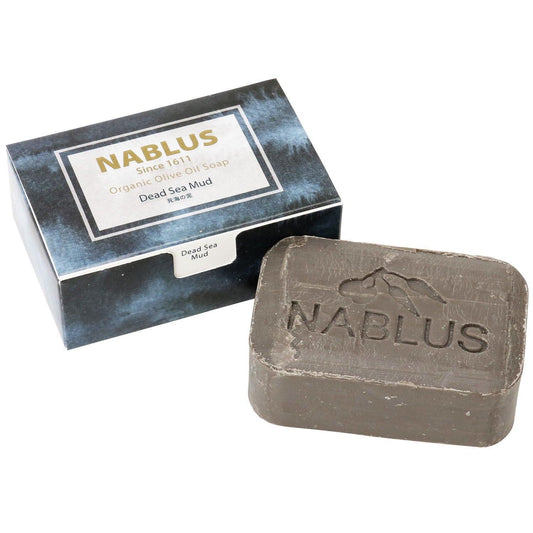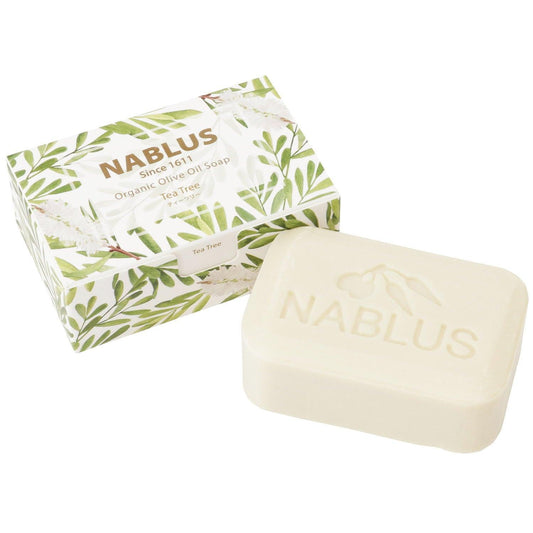NABLUS SOAP / ナーブルスソープ
NABLUS SOAP Additive-free completely organic soap (thyme) Body odor, aging odor, horn plug care 100g
NABLUS SOAP Additive-free completely organic soap (thyme) Body odor, aging odor, horn plug care 100g
Couldn't load pickup availability

Measures against body odor, aging odor, and blackheads
Thyme is the most antibacterial and antiviral herb. It is also ideal for caring for darkened square plugs, dryness, and sun spots. Also, by using it on areas where you are concerned about body odor, the refreshing scent of thyme will gently envelop body odor.
Established in 1611 Long history and unchanging recipes <br data-mce-fragment="1">The Palestinian soap family "Tubereh family" has been making soap for over 400 years. The soap is made using the traditional method of firing in a kiln, and the manufacturing method and recipe have been passed down from generation to generation only in the Tubele family.
The highest quality organic soap based on the most squeezed virgin olive oil.
Ichiban-squeezed virgin olive oil <br data-mce-fragment="1">Nablus soap is the most luxurious organic virgin olive from the West Bank of Palestine, extracted using the first-squeezed method. Made from 100% oil, it is rich in highly nutritious oleic acid and natural moisturizing ingredients.
100% additive-free soap base that is gentle on the skin and the earth
●No synthetic surfactants or petroleum-derived raw materials ●No synthetic preservatives, antioxidants, foaming agents, sequestrants, colorants, or artificial fragrances ●Sensitive skin, dry skin, oily skin, skin after sunburn・Can be used on all skin types including age skin ・Eco-friendly (biodegradable) and environmentally friendly soap ・Animal test-free (no animal testing is performed)
●Halal certified product ●Can be used by infants and young children
<Ingredients>
Olive fruit oil 67% / Sodium hydroxide 10% / Thyme oil 10% / Water 9% / Thyme leaf extract 4%
<Skin type>
Dry skin, sensitive skin, combination skin, oily skin, aged skin, normal skin
<Application>
Face wash, cleansing, body wash, shaving
<Country of origin>
Palestine
<Authentication>
ECOCERT COSMETIC / ECOCERT NATURAL / HALAL
<Contents>
100g
<Size>
Approx. 7.0 x 4.8 x 2.5cm
<JAN>
4589864720027
<About use>
●Please use as soon as possible after opening.
●There may be slight differences in shape and color, but there is no problem with quality.
● Additive-free soap is sensitive to moisture, so drain it well after use and store it in a well-ventilated place.
●Please place it out of reach of infants.
●If it gets into your eyes, be sure to rinse thoroughly with running water immediately.
●If it does not suit your skin, stop using it and consult a doctor.
●Efficacy and effectiveness vary from person to person.
\ Share /














Related Items
-

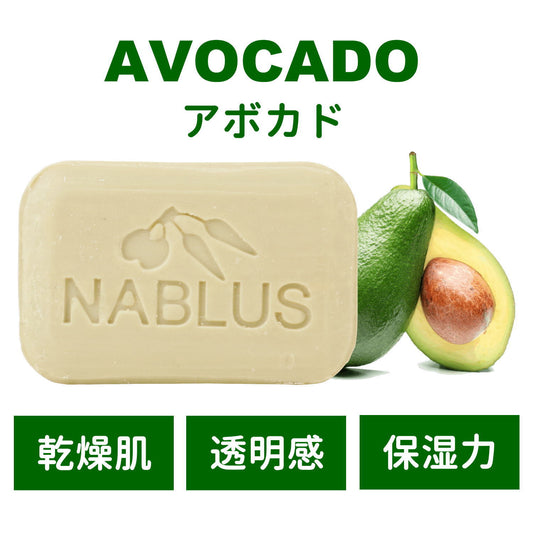
NABLUS SOAP Additive-free completely organic soap (thyme) Body odor, aging odor, horn plug care 100g
Vendor:NABLUS SOAP / ナーブルスソープRegular price ¥16,038 JPYRegular price¥17,820 JPYSale price ¥16,038 JPYSale -

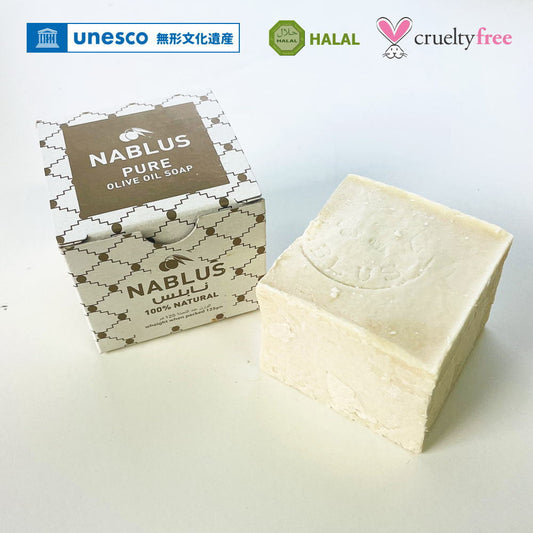
NABLUS SOAP Additive-free completely organic soap (tea tree) for rough skin and refreshment 100g
Vendor:NABLUS SOAP / ナーブルスソープRegular price From ¥1,980 JPYRegular price¥5,940 JPYSale price From ¥1,980 JPYSale -
[The last soap factory in Palestine] [NABLUS SOAP] Dead Sea mud, completely additive-free, organic soap (rich in minerals, cleanses pores) 100g
Vendor:NABLUS SOAP / ナーブルスソープ4.9 / 5.0
(231) 231 total reviews
Regular price ¥1,980 JPYRegular price -
[The last soap factory in Palestine] [NABLUS SOAP] Tea tree, completely additive-free, organic soap (for rough skin, refreshing) 100g
Vendor:NABLUS SOAP / ナーブルスソープRegular price ¥1,980 JPYRegular price
-

War hits Nablus region in the West Bank
The situation in the Palestinian West Bank is simply speechless.
The current fighting has already spread beyond Gaza to the whole of Palestine, resulting in many civilian casualties , especially children and women . -
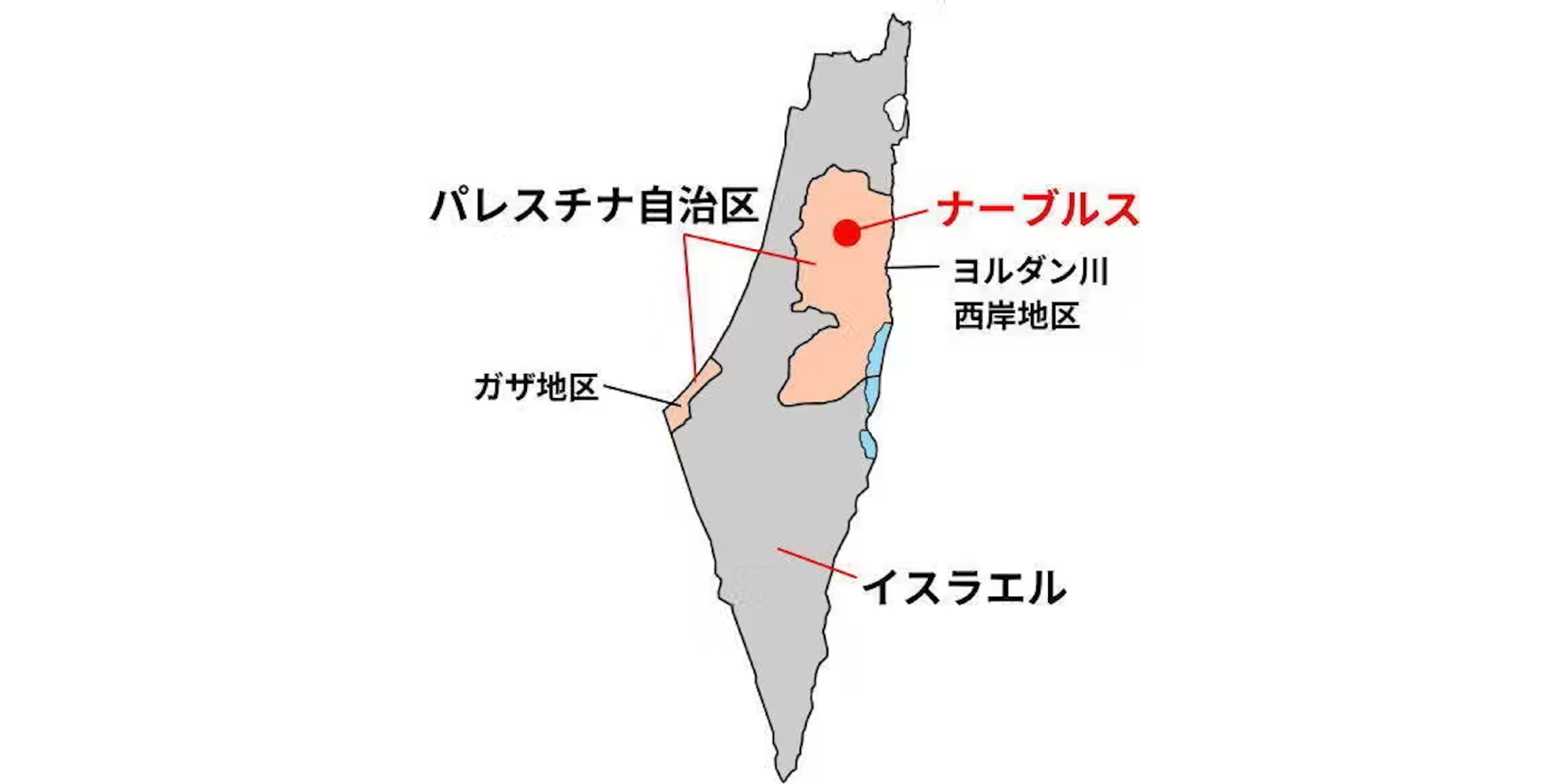
Farms that produce olives, the main raw material for soap, also became battlefields, with settlers cutting down and burning the olive trees.
As a result, most of the olive trees failed to bear fruit last year.
Then, on April 15, 2024, a victim was found among the family who ran the soap factory. -
The last soap factory in Palestine
Nablus soap has been made in the West Bank of Palestine since the 10th century, but political tensions, military conflicts and repeated wars have caused many factories to close.
Of the dozens of factories that existed in the 1900s, only two remain today. -
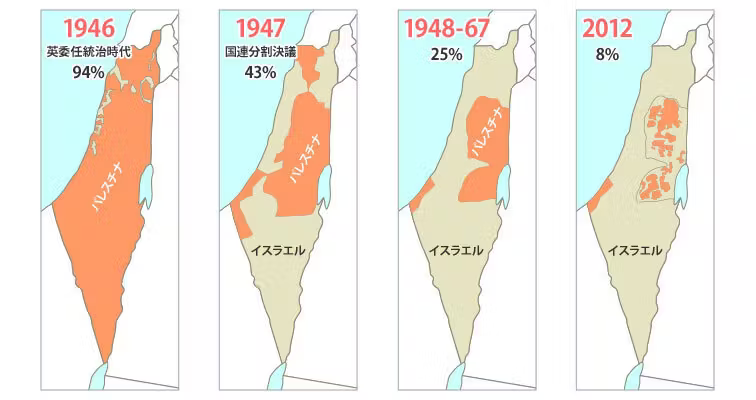
(Source: PASSIA)
Its history is long, and existing records show that soap trade began in this region around the 10th century.
In the 15th and 16th centuries, it was distributed to every corner of the Mediterranean islands, and from there it found its way to Queen Elizabeth I of England. -
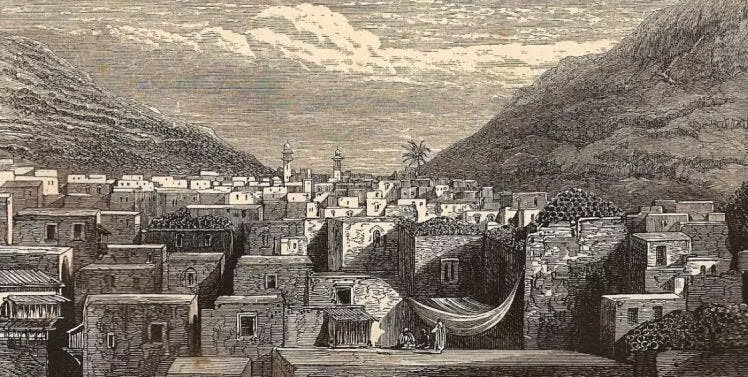
Queen Elizabeth I praised the soap highly , and it wasn't long before Palestinian soap, rich in beauty ingredients, became popular among European women.
During the British Raj (1920-1949), the British government had the soap analysed by a London laboratory in 1934 and certified that its ingredients were completely natural and free of added chemicals.
In the 1830s, John Bowring, a British political economist, traveller and former Governor of Hong Kong, described it as "a soap of great importance in the Levant (the historical name for the eastern Mediterranean region)."
The traditional handmade soap making method, which has been handed down in Palestine since the 10th century, is made using a special recipe handed down by the Tubeleh soap clan.
The soap laid out on the floor was shaped by soapmakers, and the beautiful geometric patterns created by the piles of soap have often been shown around the world.
The soap maker who cuts this soap is called a Tubeileh.
They are the family from which the soap makers' official name comes from . -
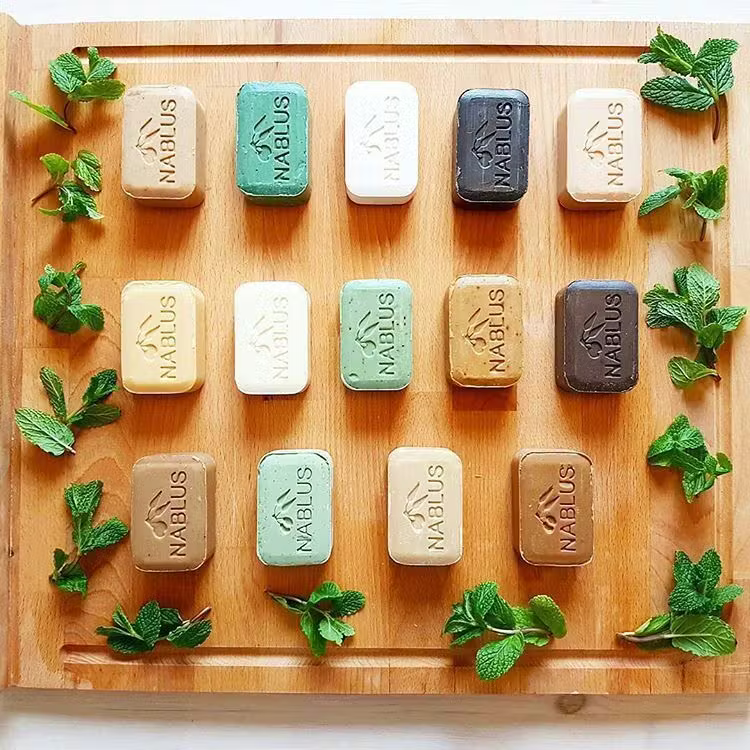
The products currently being sold are those manufactured up until 2023.
Furthermore, the soap factory explained that because the Ecocert certification organization has completely suspended the travel of its inspectors to the Palestinian area, any products manufactured in the future will no longer be granted Ecocert certification.
Olive fields, the main ingredient of olive oil, have also become battlefields, and olive harvests have declined significantly. -
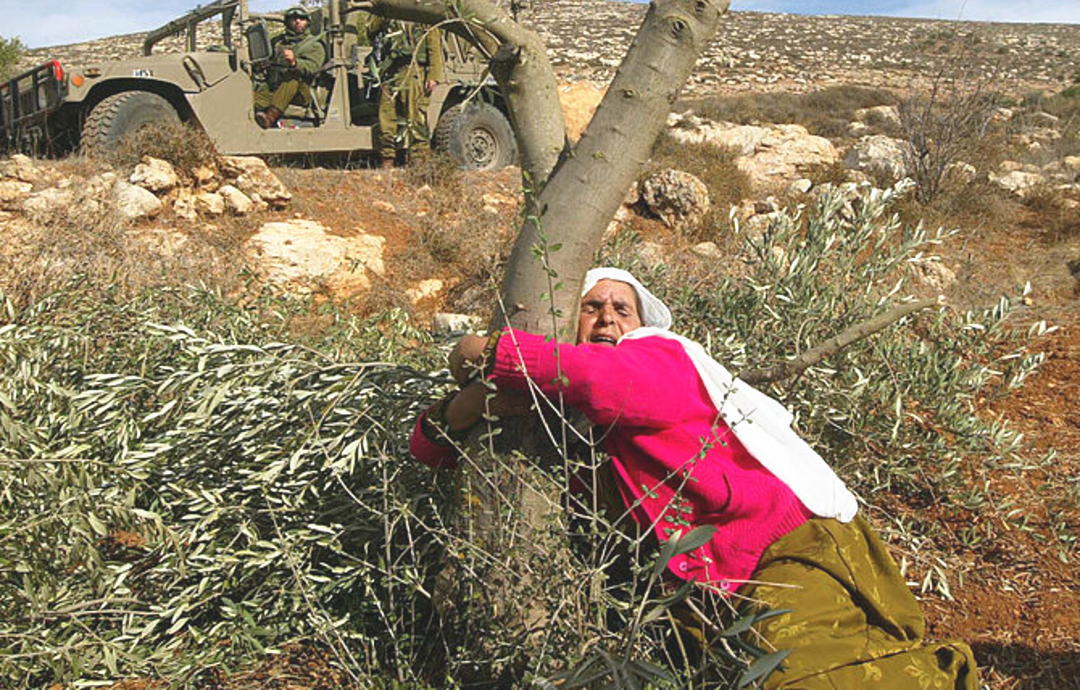
Land Stolen, Olive Trees Destroyed
The worsening situation in the West Bank
Even if a ceasefire is agreed upon, settlement activity in the Palestinian West Bank will not stop.According to the United Nations Office for the Coordination of Humanitarian Affairs (OCHA), there have been more than 1,000 settler attacks on Palestinians since October last year, leaving 1,390 people, including 660 children, homeless.
The Palestinians have repeatedly accused security authorities of condoning such violent settler attacks on villages.Today, settlers are intensifying their land plundering in this area, and olive groves that have been protected by the Palestinian people for generations are being mercilessly cut down and burned.
The olive trees that had been carefully cultivated are being cut down one after another, and the assets that had supported families' lives are being taken away.The olive tree is a symbol of Palestine and a key part of people's livelihoods, but the decline in olive harvest has led to a significant drop in olive oil production, with serious repercussions for the country.
This is especially devastating for traditional soap factories like Nablus Soap, where the price of olive oil, the main raw material, has skyrocketed and supplies are running short.
-
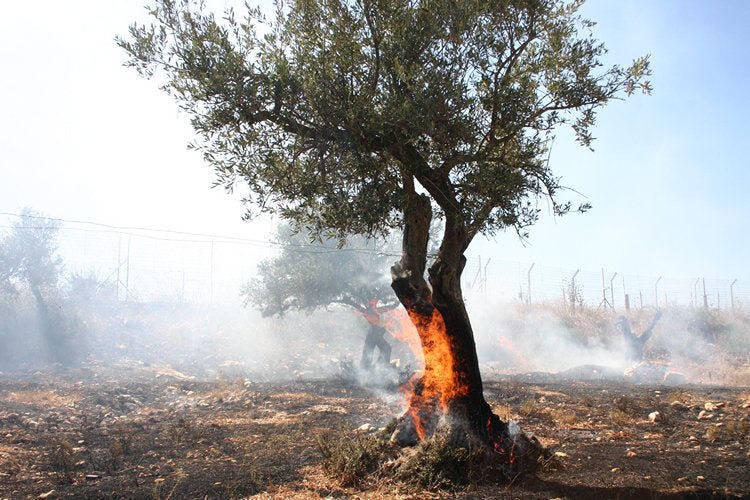
Is the war impossible to end?
These are incidents that would be enough to stun anyone in peacetime, but the country has been in a state of emergency for over 100 years, ever since the end of the 19th century, when migration to Palestine became popular against the backdrop of persecution of Jews in Russia.
The trigger for this was an attack by Hamas on October 7, 2023, which left 1,200 people dead and 251 taken hostage.
Since then, more than 41,000 people have been killed and more than 90,000 injured in Gaza alone. The area has been blockaded and has been suffering from serious water, food and other shortages for more than half a year, with people surviving hunger by eating animal feed.
Gaza has become virtually uninhabitable.
The Palestinian people are literally denied freedom and independence. -
-
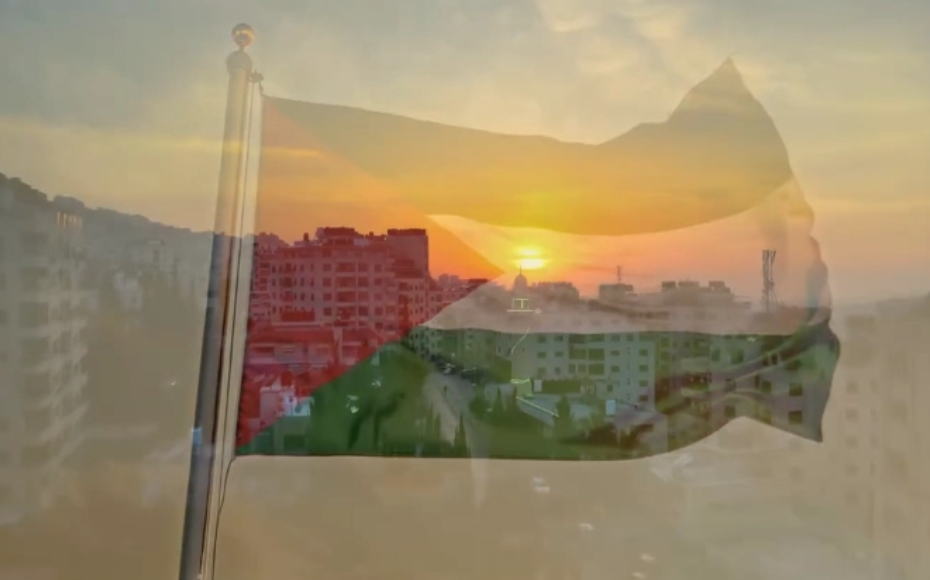
Traditional soaps passed down with unchanging passion
This soap is imbued with "feelings of peace and gratitude," a sentiment that has not changed since the company's founding , rather than "sadness or anxiety."
Even in the midst of war, that determination never wavered.Palestinian traditional soap with a long history and the damage caused by conflict.
We had no idea how many people would support our idea of sharing these two contradictory pieces of information, or how much backlash it would provoke.But this is not a "chance occurrence."
Every day, the lives of children and women are being lost, more than half of the olive groves that have existed for thousands of years have been destroyed, and even the survival of soap factories is in jeopardy.Still, we want to carry this tradition into the future.
We need your help now to protect this soap industry, which has supported the Palestinian economy. -
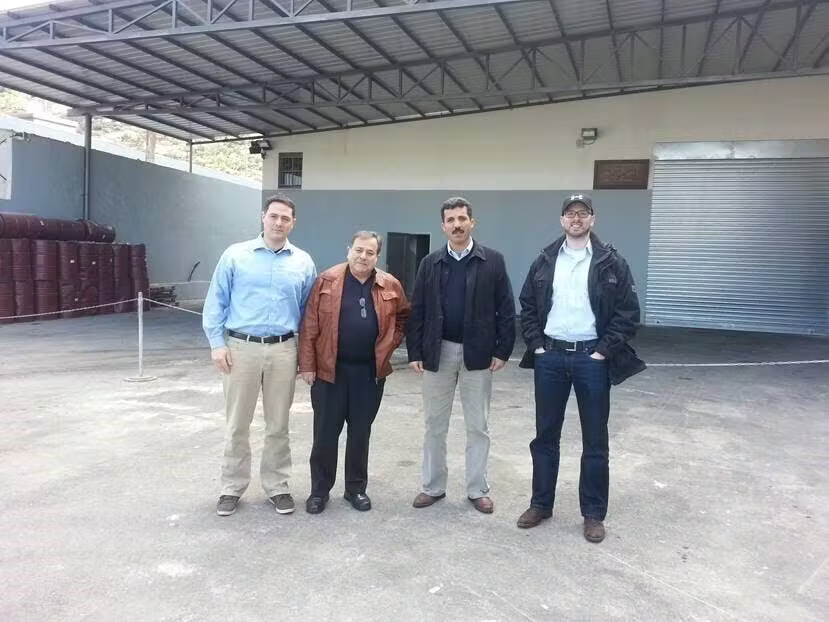
→ Below is some history, product information and background on Palestinian soap.
-
About Tradition
A traditional handmade soap making method that has been passed down in Palestine since the 10th century.
It is a "Family Secret" passed down in the Tubeileh soap clan.
The artisans who cut soap like stonecutters are called Tubeilehs .
They are the clan from which the term soapmakers originated. -
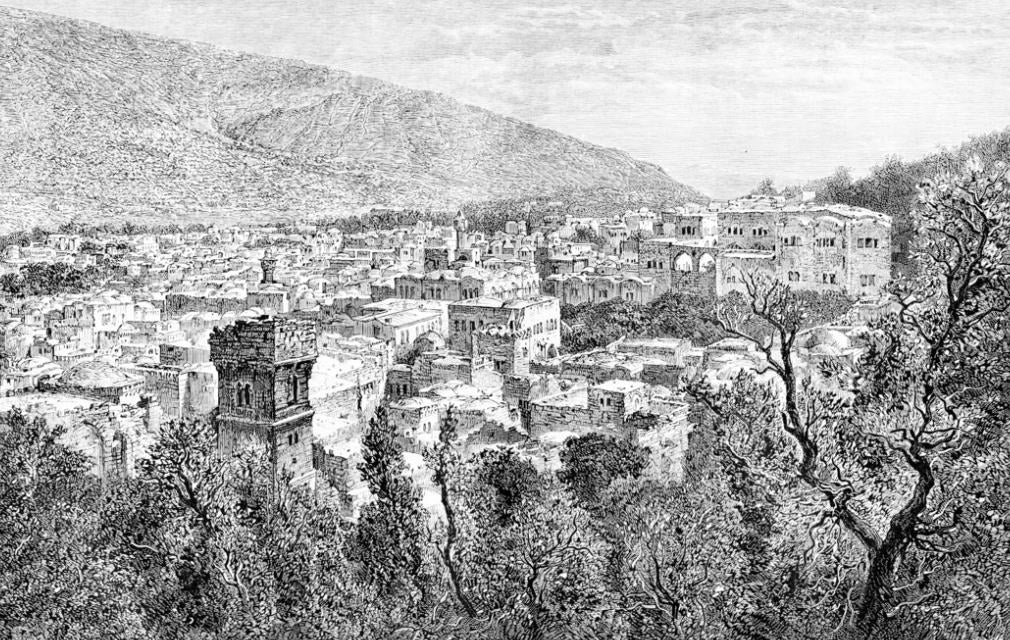
History
According to existing records, soap trade began in this region around the 10th century.
The small soaps that women in Nablus made for their own household use were distributed by the Bedouins to every corner of the Mediterranean islands in the 15th and 16th centuries, and from there they made their way to the British Queen Elizabeth I. Queen Elizabeth I praised the soap highly, and it wasn't long before Nablus soap, rich in beauty ingredients, became popular among European women.
During the British Raj (1920-1949), the British government had the soap analysed by a London laboratory in 1934 and certified that its ingredients were completely natural and free of added chemicals.
In the 1830s, John Bowring, a British political economist, traveller and former Governor of Hong Kong, described it as "a soap of great importance in the Levant (the historical name for the eastern Mediterranean region)." -
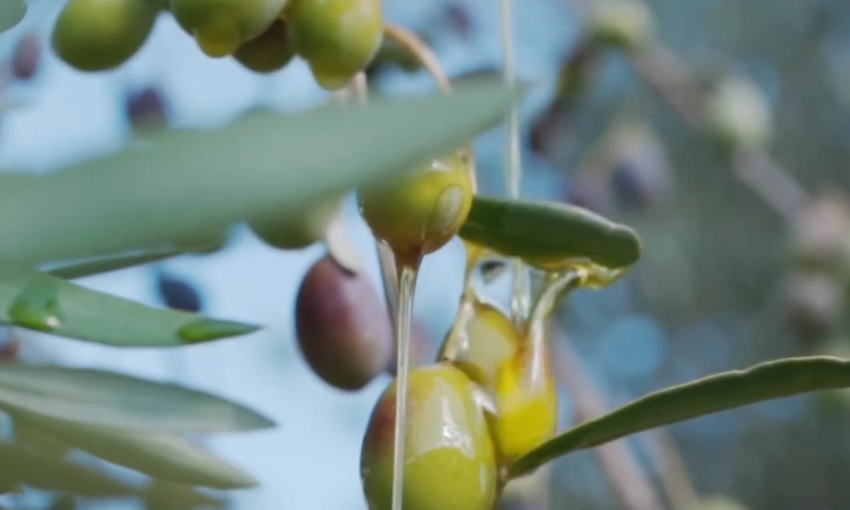
About the raw material virgin olive oil
The West Bank of Palestine is one of the areas famous for its olive oil production.
Olive trees have been cultivated in the region for thousands of years and have played an important role in Palestinian agriculture and culture.
The olive harvest takes place once a year, from early October to mid-November.
At this time of year, Palestinian rural areas are very lively. Farmers enjoy themselves as if they are holding festivals and celebrations.
The whole family participates from before sunrise to sunset, harvesting together regardless of age or gender.
If the fields are far away, we bring lunch and eat in the fields.
The scene is like a picnic.
Now, harvesting olives has become a life-risking task, and it is so dangerous for farmers to even go into the fields themselves that they are forced to outsource the harvesting work to outside companies. -
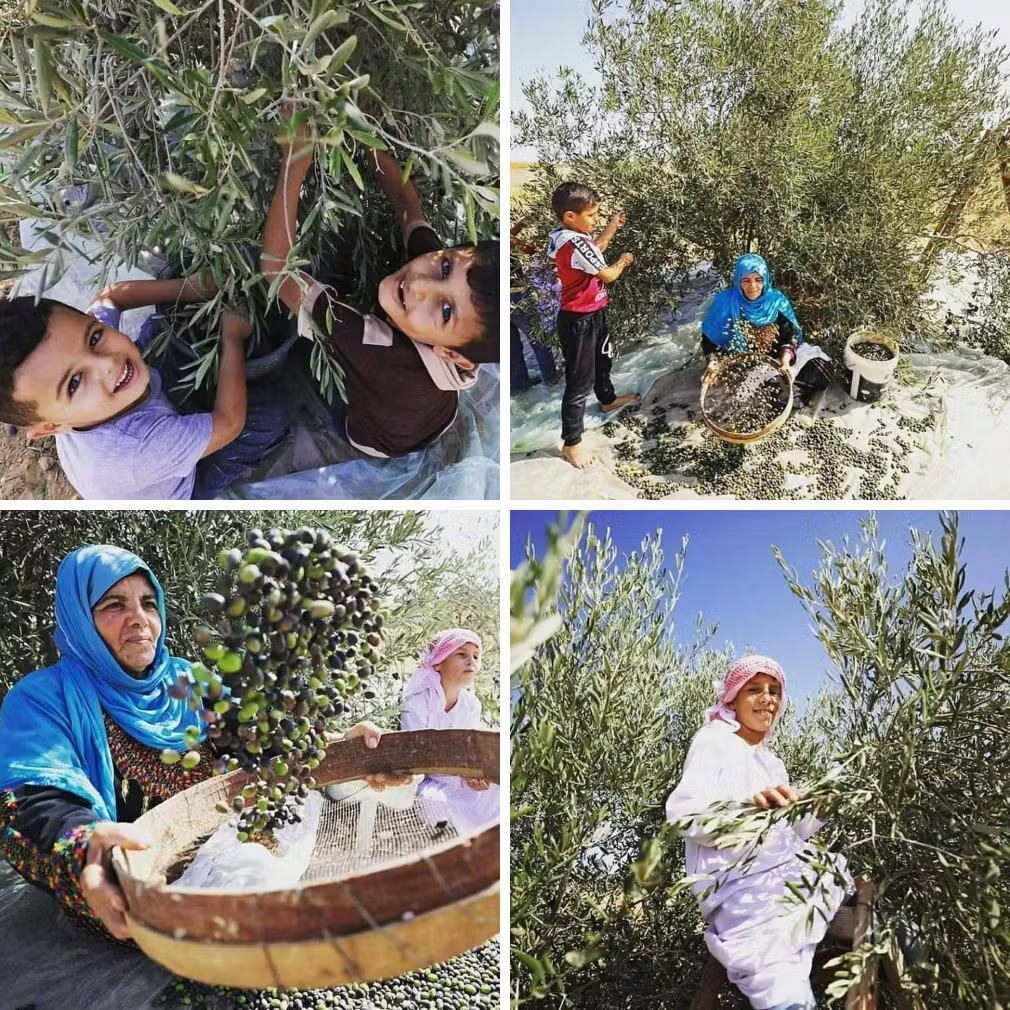
Olive harvesting in Palestine is characterised by the fact that it is essentially done by hand, without the use of machinery.
The reason for the insistence on hand-picking is due to the awareness that olives are important to Palestinians.
Another problem is that using machines can damage the olives, making it difficult to produce high-quality olive oil.
Palestinian virgin olive oil is known for its quality and distinctive flavour, and is highly valued not only for domestic consumption but also in the export market.
Popular around the world, it has won awards in many local and international competitions and is traded and certified under fair trade principles, supporting the economic sustainability of farmers. -
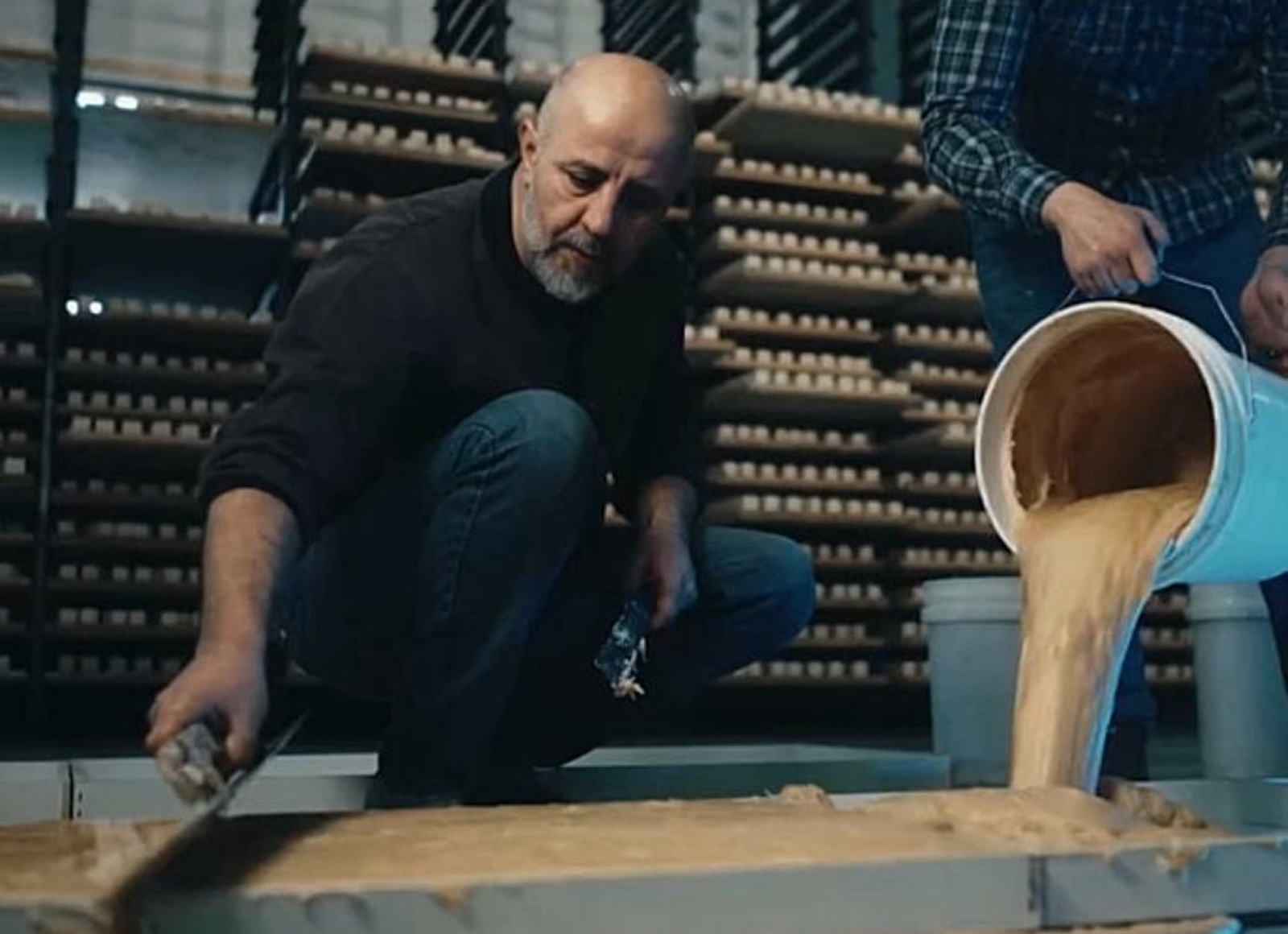
About Nabuls Soap
Nabulus Soap contains over 60-80% virgin olive oil and is made entirely from natural, vegetable ingredients, making it suitable for daily use. Nabulus Soap contains no preservatives and is not tested on animals. Nabulus Soap is made from 100% natural ingredients without the addition of synthetic substances, making it 100% biodegradable. This is not only good for your skin, but also for the environment.
Nabuls soap is an organic soap made with only a few natural ingredients based on a mixture of olive oil and salt. In order to maximize the power of the natural ingredients, it is made according to a recipe that has been passed down for over 400 years by the soap family, the Toubele.
Certifications held by Nabuls Soap
-

ECOCERT ORGANIC COSMETICS
French organic certification is said to be the strictest in the world
-

ECOCERT NATURAL COSMETICS
French organic certification is said to be the strictest in the world
-

Halal Certification
Certified by the Palestine Standards Institute (PSI)
-

Cruelty Free
No animal testing
Nabuls Soap introduction video
Nabuls Soap
About the product

About Certification
Nabulus Soap is certified organically by ECOCERT and Halal, but the ECOCERT certification is on hold after 2024 due to the difficulty of entering Palestine during the French inspection period. The quality and manufacturing method have not changed at all.
Import and sales
The Nabulus soap we handle is not a miscellaneous item but is officially imported as a "cosmetic."
Our company holds licenses for the "Cosmetics Manufacturing Industry" and "Cosmetics Manufacturing and Sales Industry," and imports and sells products after going through the proper procedures in accordance with Japanese laws and regulations.
Furthermore, we are the official contact point for Nabuls Soap in Japan.
All products are strictly inspected in Japan to ensure safety and quality before being sold.
Usage
●Please use as soon as possible after opening.
●There may be slight differences in shape and color, but this does not affect the quality.
●Since additive-free soap is sensitive to moisture, be sure to drain it well after use and store it in a well-ventilated place.
●Keep out of reach of infants and young children.
●If the product gets into your eyes, be sure to immediately rinse thoroughly with running water.
●If the product does not suit your skin, discontinue use and consult a doctor.
●Effects and efficacy may vary from person to person.





















